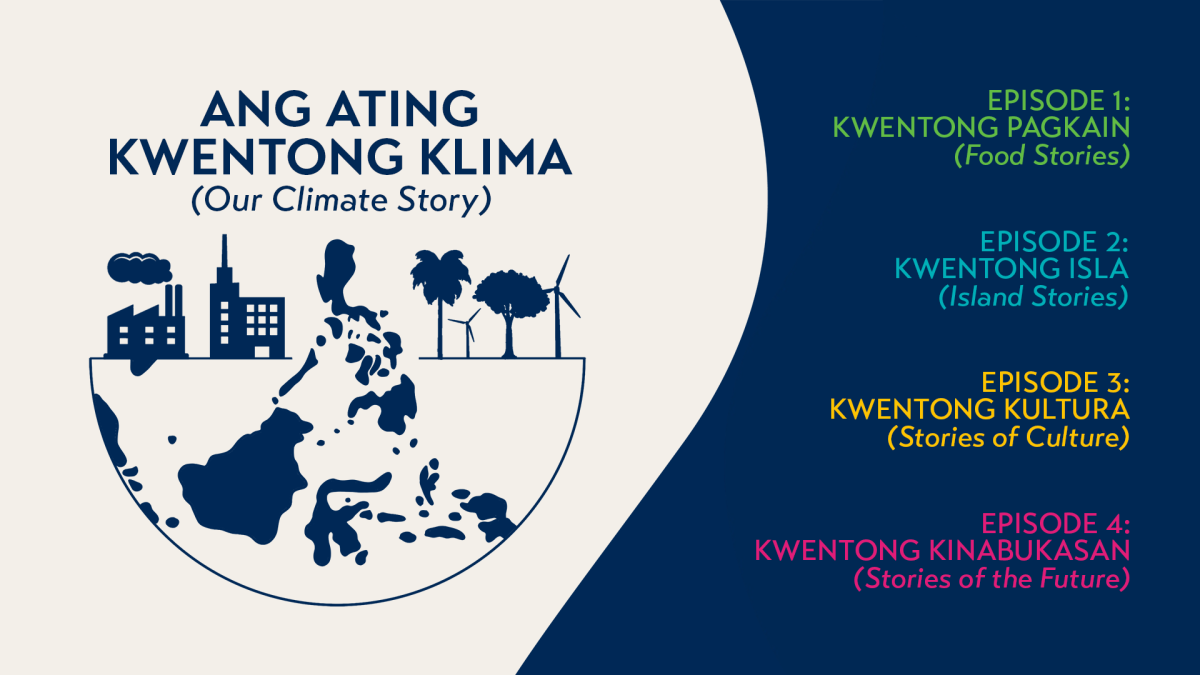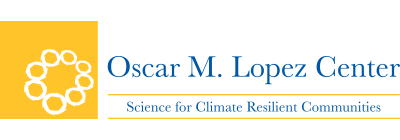Ang Ating Kwentong Klima
Our Climate Story

The Philippines is ranked high in vulnerability to climate change. This means that as the climate crisis worsens, the higher the risks are for Filipinos to hazards and devastations. As Filipinos, we see this every year when the heat rises up to 35 C during summers and floods brought by typhoons destroying thousands of homes, livelihoods, and even lives. This is our reality, an evidence of how badly the climate crisis affected and continues to affect us. This is a subject we should no longer brush off, definitely not when it will be too late.
In 2021, the Oscar M. Lopez Center launched the Balangay Media Project bridging climate science and climate storytelling that aims to effectively bring data to people in ways to better understand the state of our country. A project that aims to organize local media practitioners and climate change advocates by building their capacities for science-based reporting and utilizing traditional, new, and out-of-home media to promote climate change adaptation and resilience-building of communities.
Born out of this project is the Umalohokan Fellowship, a network of communicators that develops media blitz campaigns and research projects on relevant climate issues of communities.
In continuing this initiative of climate storytelling and bringing climate science to the people, Asia Society Philippines, in close partnership with the Oscar M. Lopez Center, launched a 4-part series on climate, Ang Ating Kwentong Klima (Our Climate Story), that outlines the problems that the Philippines have been facing and will face due to the climate crisis.
In this series, we have gathered climate experts from the country to share their knowledge and insights on the current state of country. We also feature the 2021 Umalohokan Fellows to provide an in-depth analysis on what has been happening on the ground since last year’s fellowship. Each expert also shares their hopes for the future as well as encouragements for people to take action for us to collectively save the planet and reach our climate goals.
Through Ang Ating Kwentong Klima, we ask:
- What is the current state of the Philippines in relation to the worsening climate crisis?
- How do go about strengthening our climate programs, even lessening our own carbon footprint to not exacerbate the rapid increase of disasters?
- How do we take advantage of the climate science, data, and platform we have to increase better practices from corporations and individuals to prevent further destructions to the environment?
Each episode focuses on a certain impact of the climate crisis to the country—from the issue of food security, to rising sea levels, to alarming rates of devastations brought by typhoons that are getting stronger every year, to the effects on the indigenous communities, and even the Filipino culture, we explore how climate change has been affecting every facet of our life.
Watch the full series below moderated by Kato Sarmiento of the Oscar M. Lopez Center.
Episode 1: Kwentong Pagkain
My dream is to have dignified Filipino farmers and fisherfolk, who are climate stewards and who have the capacity to do more with less resources by producing nourishing food for Filipinos. ⏤ Christine Jodloman, AGREA
Kwentong Pagkain (Food Stories), the first episode of the series, discussed the impact of climate change on food security in an agricultural country like the Philippines. We are joined by Ayn Torres of the Oscar M. Lopez Center, Christine Jodloman of AGREA, Mavic Conde of Team Bicol Umalohokan, and EC Toledo of Philstar and Team G-Unit.
Episode 2: Kwentong Isla
They (affected communities) experience climate change but for them it remains a question of 'why does this happen?' and 'what are the things that we can do?'. Which is also what we want to communicate, the science part of climate change and the actual on-the-ground experiences and stories of communities and its members. ⏤ Juan Miguel Torres, Team Salikhain Kolektib
Kwentong Isla (Island Stories), the second episode of the series, talked about the impact of climate change to the lives of Filipinos in an archipelagic country, especially the coastal and island communities. Joining us are Dr. Laurice Jamero of the Manila Observatory, Juan Miguel Torres of Team Salikhain Kolektib, and Candeze Mongaya of Rare Philippines.
Episode 3: Kwentong Kultura
The most vulnerable sector of the community that are sensitive to climatic event are those communities that are resource dependent⏤they rely on their livelihood and income directly from the resources from the environment⏤and any perturbation and changes will really affect them. ⏤ Ronald Maliao, Salumayag Youth Collective for Forests
Kwentong Kultura (Stories of Culture) explored the effects of climate change on indigenous communities and their culture. Joining us in this conversation are Dr. Noralene Uy of the International Recovery Platform, Robert Mansalo-on Cahapon of Salumayag Youth Collective for Forests, and the Team Bintuwak Umalohokan Fellows, Ronald Maliao, Ritchel Cahilig, and Richard Cahilig.
Episode 4: Kwentong Kinabukasan
When we talk about climate futures, we are not talking about the distant future, we’re talking about the future being here. It might not be in your area or community yet, but it might be according to the climate scenarios, and that’s where climate scenarios play a part. It can guide us on what we can prepare for in the future. ⏤ Kato Sarmiento, Oscar M. Lopez Center
Kwentong Kinabukasan (Stories of the Future) discussed the country’s climate resiliency projects and explore how we can reach our climate goals. Joined by Dr. Faye Cruz of Manila Observatory, Asia 21 Fellow Atty. Lesley Y. Cordero of World Bank, and Umalohokan Fellow Arch. Arlene Lusterio of Team DanTAOn.
Ang Ating Kwentong Klima is produced in partnership with the Oscar M. Lopez Center

About Oscar M. Lopez Center
The Oscar M. Lopez Center for Climate Change Adaptation and Disaster Risk Management Foundation, Inc. (OML Center) is a non-profit organization born out of a private sector initiative to enhance support for research and innovative solutions towards climate change adaptation and disaster risk management. It is rooted in the principle that science must play a role in building the resilience of communities through actionable knowledge. Founded in 2012, the OML Center was established in response to an apparent research gap that was alarmingly disproportionate to the climate-related risks and vulnerabilities of the Philippines. The first of its kind in the country, the OML Center continues to be the only privately funded grant-giving non-governmental organization (NGO) doing research-based climate change programs and initiatives.
And a Special Thanks to our Promotional Partners:
